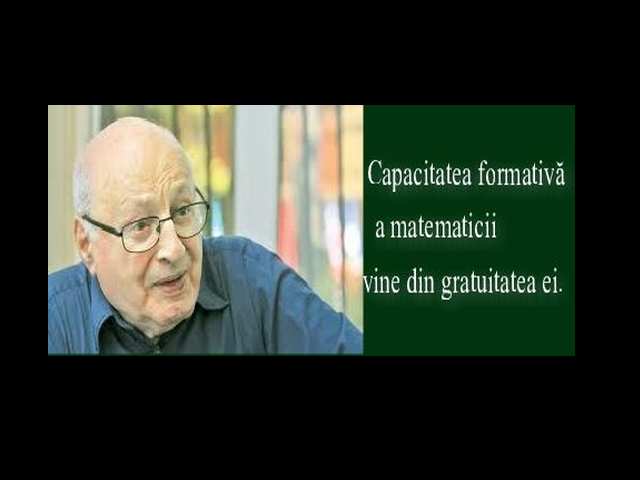From mathematics to poetry
Academy member Solomon Marcus gave an interview to Radio Romania at the age of 90, speaking on a variety of topics, including mathematics and poetry.

Corina Cristea, 13.03.2015, 14:55
“I’ve always believed that one of the great opportunities in my life was that of choosing this profession, that of teacher and researcher of mathematics and all its extensions, which for me reach everywhere,” said Solomon Marcus. His is a life lived under the question he put to himself as a child: ‘What if I looked further and further?’
“The world is what we are able to see. And if our imagination is sufficiently rich, the world we live in is equally rich.”
Solomon Marcus is the author of many interdisciplinary studies, applying mathematics in linguistics, theatre, poetry, natural and social sciences, visual arts, etc. He has even received an award for literary criticism. His work has been translated in many languages and he published over 50 books and hundreds of science articles in Romania and abroad.
For Solomon Marcus, the first encounter with poetry was when he was around 15, reading a poem by Eminescu. He said: “It was like being under a spell. I later experienced the same state when I started reading Rilke, Edgar Allan Poe and Baudelaire. I only turned to mathematics much later, because the mathematics taught in school was not orientated towards ideas, a vision, but was a victim of a mechanical process. It cultivated a sense of order, but it wasn’t anything profound”. Solomon Marcu also talks his interest in other disciplines besides mathematics:
“The first language models studied in informatics came from biology: the nervous system and then heredity. What we in fact dealing with here is an intellectual process that engages a great variety of disciplines: linguistics, mathematics, logic, biology, psychology, and much more. This is how I arrived at semiotics. I came to realise that knowledge cannot be limited to a single discipline.”
You don’t have to have a degree to understand literature, but that’s not the case with mathematics, which requires a systematic learning process, says Solomon Marcus:
“The grandeur of the spectacle of human knowledge comes first and foremost through the way in which the unity of the world manifests itself in the most diverse of ways. I’m referring to a certain unity, a kind of profound simplicity. As long as we stick to a truncated representation, which splits the world into different slices, each slice with its own vision, we will not achieve a unifying vision. We need to be able to see what the world looks like even when we look at specific images coming from all directions. We should, for example, realise that isomerism in chemistry is in its essence of the same nature as human heredity and the way we use sounds in language, and they are all subject to the idea that structure prevails over substance. All this and the profound similarity between apparently varied appearances led to the emergence of structuralism. It is here that we find the pleasure of knowledge and the satisfaction of the fact that you understand the world.”
The Internet is a great tool for this kind of understanding, says Solomon Marcus:
“The Internet is still young, so we are in a period of transition, as we find both many scholars who are not yet Internet literate and young Internet enthusiasts who cringe at the suggestion that they may enter an actual library and consult a source that predates the Internet.”
Even if at some point the Internet will take over printed culture, says Solomon Marcus, for the time being we have to have combined education, because we are at an important crossroads.





























